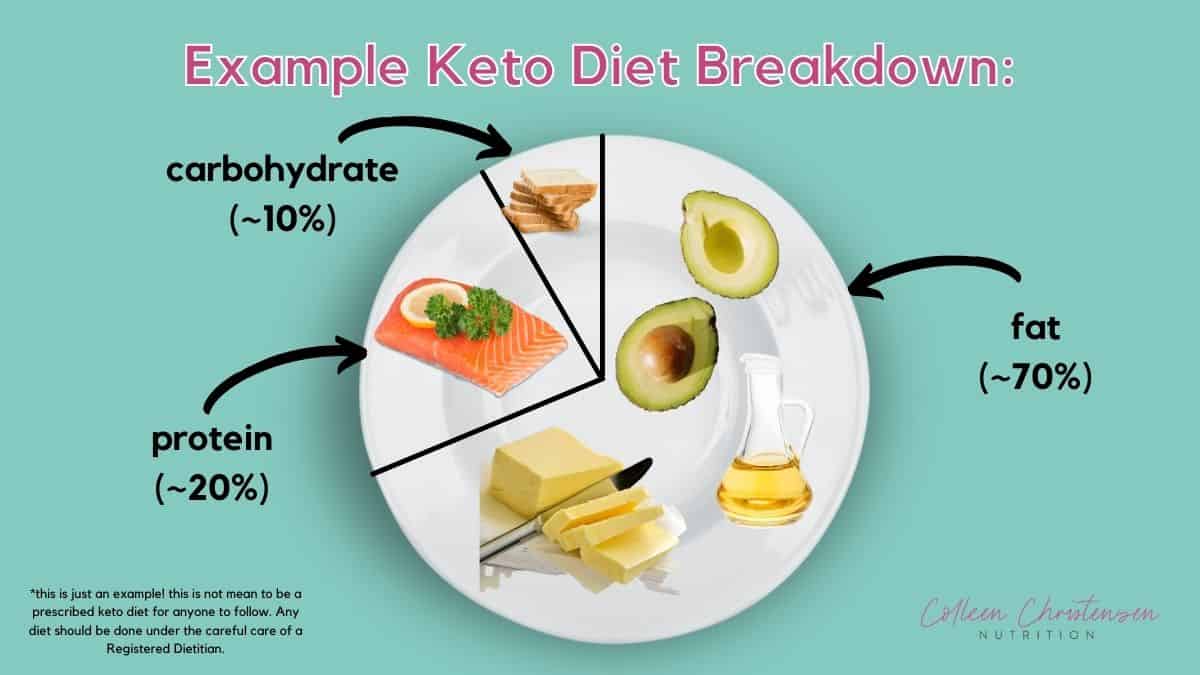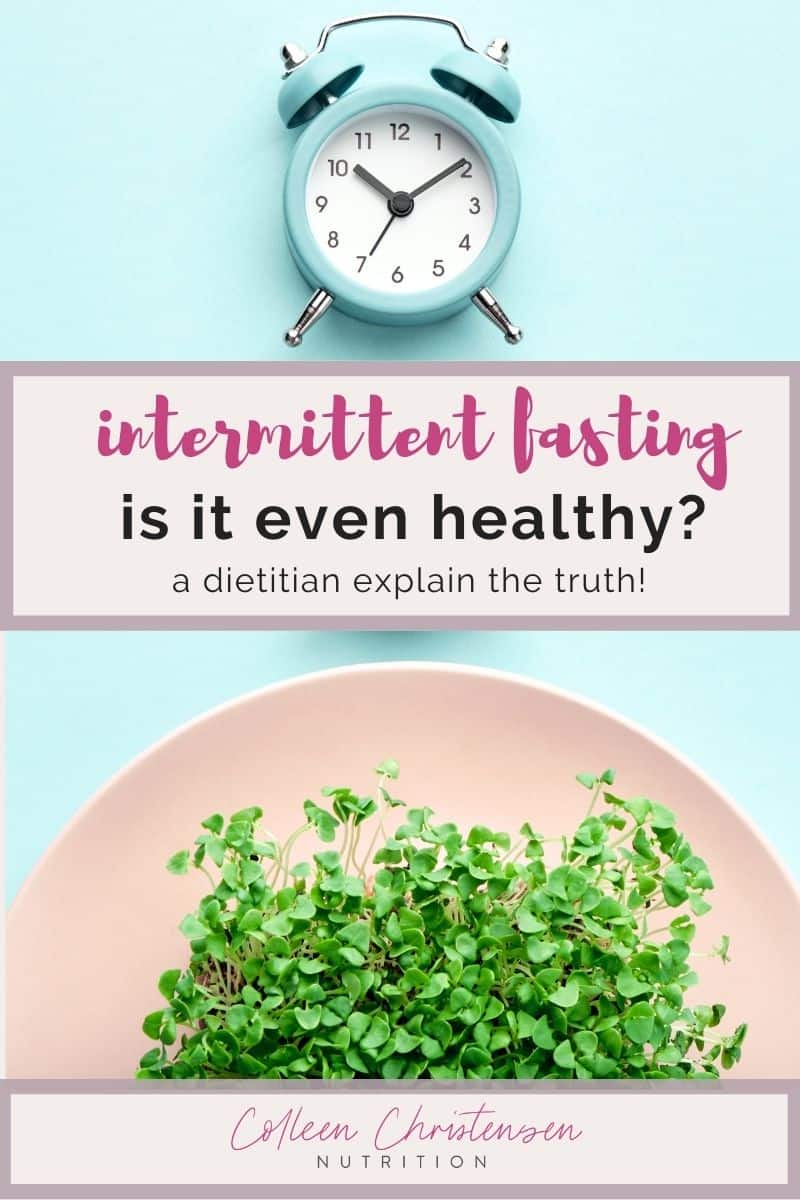If you spend even 5 minutes online chances are you come across some sort of post talking about the keto diet. It’s everywhere! I dug into the research and in this post I’m going to go over what the keto diet is, what the proposed benefits are and the potential negative effects. Be sure to give this a read before you go hiring yourself a “keto coach”!

What Is The Ketogenic Diet?
The ketogenic diet (AKA “keto”) first originated as a diet for the treatment of epilepsy in children. Due to its success in treating epilepsy, it has been investigated over the last 100 years or so for the treatment of other chronic diseases.
The keto diet is a diet that consists of restricting all macronutrients to fit into certain amounts to allow the body to enter what’s called “ketosis”. This is where the body is using fat as our primary source (VS the preferred source of glucose) of fuel and the idea is that we can ‘tap into’ ‘undesired’ fat stores in our body and burn it for weight loss (which isn’t always a good thing – see my blog post discussing body composition for more on weight loss VS fat loss)
Keto is most commonly known for being a high fat, low carb diet. Which is true, however what isn’t well known is that one must also restrict protein as well to be “truly” doing keto. This is because protein intermediates (think the different steps/molecules of breaking down a food into energy) of protein and carbohydrate metabolism have some overlap.
Our body does this (overlapping the breakdown of carbs and protein) to actually prevent you from going into ketosis – which is typically our body’s last ditch resort for energy! This is what’s commonly called the ‘fasting taste”, when our bodies turn to fat as our source of energy when our muscle’s glycogen stores have been depleted.
So, for someone on keto, here is a sample of what their daily energy sources might look like:

One very important thing to note is that when true keto diets are prescribed to a patient by a Registered Dietitian in a clinical setting they are VERY individualized. I actually have a background in working in a clinic that deals with inborn errors of metabolism and alongside a ketogenic dietitian. They are NOT one size fits all and the prescribed amount of macronutrients can get down to decimals!
Is Keto Different From A Low Carb Diet?
I think it’s important to bring up the modified Atkin’s diet (AKA “MAD”) here before we go further. The Modified Atkins Diet is a low carbohydrate diet, though is not necessarily “keto”. This diet emphasizes protein and limits both fat and carbohydrate, though is not low as carbohydrate (or low protein!) enough to induce ketosis or be deemed ‘keto.’
This isn’t the same thing as keto and when I was working in the metabolic clinic the “MAD” diet would be prescribed to patients for a variety of reasons (compliance, their needed standard of care, etc) since it’s not as strict as keto. They’re definitely NOT the same.
This is typically much closer to what people think of when they think “keto” (and what most “keto coaches” teach & preach) than the previously described, very individualized and specific clinical diet I described above.
Proposed Benefits of the Keto Diet
I’m going to divide this section into two: specific disease states and then general benefits!

Disease States That May Benefit From A Keto Diet
Epilepsy
Children with epilepsy have seen improvements in seizure reduction in a retrospective study looking at children’s ‘keto-type’ (classic ketogenic, MCT as the fat source, and modified Atkins diet) diets over 10 years. The majority of patients had reduction in seizures, though the diet duration or ketogenic type did not predict the reduction in seizures.
As a note, children experienced constipation (65%) and parents as the nutritional gatekeepers of the program found it difficult to maintain the diet (10%), leading to the cessation of the keto diet. This diet may be helpful in reducing seizures, though more research on how to help children and parents stick with it will be helpful in determining its long term success for reduction in seizures.
Amyotrophic Lateral Sclerosis (ALS)
For those with ALS, a mouse model preliminarily indicates that those that follow a ketogenic diet lose their motor performance later than those as a part of the control group. Knowing this, this may be helpful to investigate in humans on how diet may improve neurological outcomes in this disease.
Parkinson’s Disease
For those with Parkinson’s Disease, those who followed a keto diet had improved cognition and reduced the accumulation of the protein that causes Parksinon’s symptoms, though participants did not see improvements in movement. This study sounds promising for those with this condition, though more research is needed to better understand how the keto diet may further impact those with Parkinson’s.
Alzheimer’s Disease
A review of keto used for treatment of Alzheimer’s disease highlighted that long term ketogenic therapy improved memory, though did not improve psychological health, executive ability (self-control), and attention.
Multiple Sclerosis (MS)
Historically, dietary interventions have not been helpful in eliminating MS symptoms. A mouse model with mice eating the keto diet showed that among 20% of animals tested, all MS symptoms were eliminated – hinting that keto may be a beneficial treatment for this other neurological condition.

Additional Proposed Benefits Of The Ketogenic Diet
Cognitive Function
In a mouse model, we know that a ketogenic diet extends the longevity in adult male mice and improves motor function, memory, and muscle mass. Though this is promising among mice, more details are needed to determine its benefits in humans.
Insulin Sensitivity
In a online study over 32 weeks comparing the “Plate Method” (essentially building a “healthy plate” with a variet of food groups) to a ketogenic diet among Type II Diabetes patients, they found those that followed the ketogenic diet had a lower A1C (the measure of how much our red blood cells are carrying glucose (our body’s favorite carb)) than the control group – though both of them reduced their A1C. Participants in the ketogenic group also lost more body weight, lowered their triglycerides, and less of them dropped out from the study (8% versus 46%).
What can we take away from this? We know that by incorporating positive lifestyle factors such as eating less foods that are high in carbohydrates but nutrient scarce, we can improve our overall health – we saw this among both groups. It is difficult to attribute this to the ‘keto’ diet alone, when we know both diets are overall improving in their nutrient quality. This study also only lasted about 8 months – I’d be interested to see what health outcomes look like beyond that time – is it sustainable?
In another study conducted on 10 (yes, only 10) *bese patients with Type II Diabetes on keto in a mean energy deficit of 1027 calories/d for 14 days, participants lost weight, improved their A1C, normalized their fasting glucose, improved their insulin sensitivity by 75%, and decreased their TGs and cholesterol levels. If this sounds too good to be true, it probably is.
Decreasing one’s energy by more than 1000 kcal/d is dangerous, this is a SUPER short duration of only two weeks, and only has 10 participants – making stronger statistical tests impossible to determine that this keto diet was the sole ‘improvement’ in these markers, when the caloric deficit sounds like they were putting their participants through extreme (and dangerous) conditions.
Other studies (here and here) have highlighted that both keto diets and low-glycemic (how simple the carbohydrate is and how easily it alters your blood sugar (ie white bread alters blood sugar faster due to less fiber than wheat bread with more fiber)) saw improvements in fasting glucose, fasting insulin, weight loss, and A1C, though the keto group had more improvements in A1C, bodyweight, HDL, and more reductions in diabetes medications. We also know that eating in a caloric deficit and the long term effects on our metabolism are greatest with a low-fat diet.
What does this say to me? That these nutrition choices are highly individualized – and whichever you can stick with to improve your health by intuitively choosing which fits your lifestyle best can help to improve your health.
I also reached out to a friend of mine, Dione (@prediabetes.nutrition in IG!) who is a Registered Dietitian who work with prediabetes and diabetes clients. Here is what she had to say:
None of these studies look at the impact of eating keto/low carb on mental health. Just as overall health doesn’t exist in a vacuum, neither does blood glucose management. Yes, reducing hA1c and fasting blood glucose are the primary goals for managing pre and type 2 diabetes. But at what cost? I would be curious to see the impact of eating a keto diet long term on mental health.
The one study went out to 12 months. But what about 5 years from now? Is the keto diet really sustainable for 5 years? How about 15? The way we eat to reduce our blood glucose is the way we have to KEEP eating forever. I don’t see how it’s a sustainable way of eating for people with elevated blood glucose. Following a keto diet for blood sugar management just sets you up to yo-yo on and off keto for the rest of your life. And we know that yo-yo dieting is not good for our health.
The keto diet demonizes carbs. For people with pre and type 2 diabetes, who are already fighting off the food police in the form of members of their health care team (doctors, nurses, dietitians)… hearing that carbs are “bad for you” and “can kill you” only perpetuates disordered eating and feelings of guilt and shame when eating carbs. Because they are constantly told that carbs are harmful for their health. I don’t see how it’s possible to have a healthy relationship with food while on the keto diet- especially for those with diabetes.
Dione of @prediabetes.nutrition
Sports Performance
In a review among keto in endurance athletes where there is lower intensity versus higher intensity exercise (think running versus sprinting), the keto diet may be helpful in performance, but the effects on body composition are unclear on how it may affect glycogen stores for the athlete (where we store our carbs for quick energy in our muscles).
Glycogen stores are crucial for both the athlete and non-athlete to prevent entering the fasted state. We enter the fasted state once our glycogen stores are depleted. When exercising, we are typically burning all three macronutrients.
For this area of research, the idea is that by eating a keto diet and deferring the need for glycogen stores and relying on fat stores that can store more energy than our glycogen, we can improve our performance by relying on fat as our primary (and almost sole!) source of fuel. I.e. we’re not hitting ‘the wall’ when exercising – which happens when we transition fuel sources during our workouts.
For improvements in performance, it may take several months to acclimate to this diet and for the adaptation of muscle glycogen to provide benefits to the athlete. Overall, we know that diets where carbohydrates are emphasized (highly specific to the sport, type of training, etc.), we see better aerobic, anaerobic, and strength performance.
Potential Risk Of The Keto Diet

Cardiovascular Health
We have years of research that a diet heavy in saturated fat (butter, coconut oil, etc.) is not great for our health. Thought it appears that a 6 week ketogenic diet is not harmful (n=12, all men) and we may see some marked improvements in fasting lipids, insulin, HDLs, and LDLs, there still appeared to be increased sizes of LDL (the ‘bad’ cholesterol) particles, though there were no significant changes among the control group. Though we did see some improvements among health markers for those on the keto diet, this sample is small and still contributes to increasing LDL size.
The “Keto Flu”
The ‘keto flu’ is the adjustment period once starting the ketogenic diet that can cause headache, fatigue, nausea, dizziness, brain fog, GI discomfort, decreased energy, feeling faint, and changes in your heartbeat. As we talked about the changing of fuels in the exercise portion of this blog post, it’s essentially like hitting the wall on your run but for a MUCH longer period of time than a few minutes and can be anywhere from 3-30 days. What’s important here is to drink plenty of water and to ensure that you’re eating plenty of vegetables to ensure that you don’t start to develop nutritional deficiencies (which we’ll talk about in a moment!).
Kidney Stones
When following the ketogenic diet, you may develop kidney stones due to changing the acidity of your urine by what you eat (everything’s connected in our bodies!), which are incredibly painful and not fun to deal with AT ALL. You may be able to prevent them by supplementing to make your urine less acidic, but this is something that is often not thought about when pursuing a ketogenic diet.
Negative Body Composition Effects
We know in children with epilepsy that after 15 months of following the keto diet, that growth and bone status were not optimal – and had suboptimal vitamin D – which can make you feel tired, irritable, give you muscle and joint pain, and alter your bone density.
You may lose weight and body fat following a ketogenic study (hello energy deficit!), though this loss will slow when consuming the ketogenic diet while your body goes to use protein as an energy source and you begin losing fat free mass.
We even know from a study comparing groups with controlled protein intake and resistance training (the gold standard way to burn fat and build muscle), that both groups lost fat though there was significant difference in fat loss among the two groups. But, those that followed keto versus a diet that didn’t restrict carbs didn’t see changes in total body weight or muscle mass (which is what we want!). The group that didn’t restrict carbs saw improvements in these areas. See my post here on why weight loss isn’t always good!

Exercise Performance
As mentioned above, the long term effects on muscle glycogen remain unclear, which is key for athletic performance. As a note, performance nutrition studies generally have a small sample because of a small amount of funding by both public and private research funding and are generally focused on male athletes.
Why so little funding? We have so many more pertinent nutrition problems to solve than how we can have better sports performance: namely food insecurity, heart disease, diabetes, and cancer to name a few. This area of nutrition is growing and is fascinating, but the funding isn’t there quite yet: giving us small samples and limited findings.
Liver Disease
Because you are altering your diet when following a ketogenic diet, it can cause dyslipidemia which is part of an inflammatory state causing a fatty liver. So, while keto may be beneficial for some cell types in a mouse model, it may not be beneficial for other cells and could be harmful. This needs to be further investigated in humans to better understand how to ketogenic diet can be best used (or not!), because in terms of affecting cells in the body, with the ketogenic diet you may be ‘robbing Peter to pay Paul.
Risk Of Nutrient Deficiencies
Ultimately when restricting two macronutrient groups, you run the risk of creating nutritional deficiencies. Many of the grains that we consume are fortified to reduce things like birth defects and ensure that we are getting all the vitamins we need – when we limit these, we lose access to some of these vitamins and minerals we need.
With also reducing our carbohydrate to <50 g per day, we must also carefully plan out all of our ‘carbs’ to go to eating vegetables to ensure we get the nutrients we need and are necessary for our metabolism to function optimally.
We know in children with epilepsy that after 15 months of following the keto diet, that growth and bone status were not optimal – and had suboptimal vitamin D – which can make you feel tired, irritable, give you muscle and joint pain, and alter your bone density.
What does this mean? Keto requires very careful and detailed planning to ensure all of your nutrition needs are met – and you may even need to supplement.
Gut Health
Those who have tried a ketogenic diet have complained of constipation, and difficulty staying with the diet for their cancer treatment due to feeling that much more ill while on the ketogenic diet. We know from a short term study on children with epilepsy that there were no significant changes in the gut microbiome with bacteria that contribute to these children’s inflammatory state, all the while the diet can be causing more difficult side effects to deal with.

Disordered Eating And Food Obsession
You can see my post here on food obsession and how our body when it gets food can give us the same ‘reward’ stimuli as the social stimuli such as positive expressions from friends, our own social reputation, and maternal and romantic love through dopamine. Who doesn’t want to feel good? When we restrict our food (let along 2 macronutrients!), it will make us want the food even more – causing disordered eating patterns and obsession surrounding food.
Social Detachment
Food is social and cultural – there’s a reason why we as dietitians receive training on food in different cultures to best serve our community. When following keto, you won’t be able to grab a marg on a patio with coworkers after work as it’s warming up, or grab ice cream with your partner following a long summer walk or baseball game.
Our food system in the US is also not set up to be conducive to a ketogenic diet – very few restaurants highlight that there foods are keto friendly. And, with having to be aware of restricting two macronutrients, you can’t just eat whatever and be fine – you have to be mindful of both your carbohydrate and protein intake.
But, Do Our Bodies REALLY Need Carbs?
Yes and no. Our brain is super smart regardless of the amount of education or training we have. Our brains heavily PREFER glucose, though can operate on lactate and ketones, the energy molecules developed during both anaerobic and fasting conditions (this is a loose term because as we discussed earlier the fasting state is mimicked while following a ketogenic diet). Our body will prefer using glucose (carbs) as its main energy source, though our bodies (and brains!) are smart and can adapt to survive even when conditions are not ideal and the actual operation of the brain likely won’t be at it’s best.
In short: Can we survive? Literally, yes. Can we thrive? Probs not.

Will The Keto Diet Lead To Weight Loss?
Despite what every Instagram keto coach might say the answer isn’t really a hard “yes”. Not for the long haul anyway. We don’t have a lot of long-term research on the impacts of the ketogenic diet on weight loss. Like any diet where you’re eating in a deficit, you will lose weight – though it may not be sustainable.
We know from one of the Biggest Loser studies that those who participated in the program have to work out more and stay in more aggressive deficits than prior to losing weight on a restrictive diet to maintain their weight loss.
This is due to our settling points – AKA our “set point weight“- and the body wanting to get back to what it deems as ‘normal’ for you. We know that health behaviors over weight loss is a better predictor for our long-term health than our weight status (because we know that BMI as a health indicator is bogus anyways).

My Final Thoughts On The Ketogenic Diet
We can have an open mind to better understand keto, but to truly understand its potential benefits, we need to discuss that sticking to a diet is hard, let alone one that restricts two of the three macronutrients (⅓ – ⅔ of dieters even regain the weight back!). So, if one pursues keto, but has ‘cheat’ days or meals, they’re not in ketosis.
If not following the keto diet to a ‘T,’ you’re just eating a sh*tty diet (or lack thereof ). This sh*tty diet of high fat, low protein, and probably an increase in carbs since you’re craving them so bad can open you up to a host of all sorts of poor nutrition behaviors, such as binging, being obsessed with food, constipation, missing out on social interactions with food, and further damaging your relationship with food.
The jury’s still out on cancer treatment and athletic performance as emerging areas of study, though following keto may be helpful for those with epilepsy and other neurological conditions. As always, consult a Registered Dietitian and health professional prior to starting any diet for clinical management – managing chronic disease is something you shouldn’t do alone!
Other Posts You Might Like:
XOXO
-Colleen
This blog post was written by Colleen Christensen, RD and researched and written with the help of Amy Sharn, MS, RDN, LD.










Leave a Reply